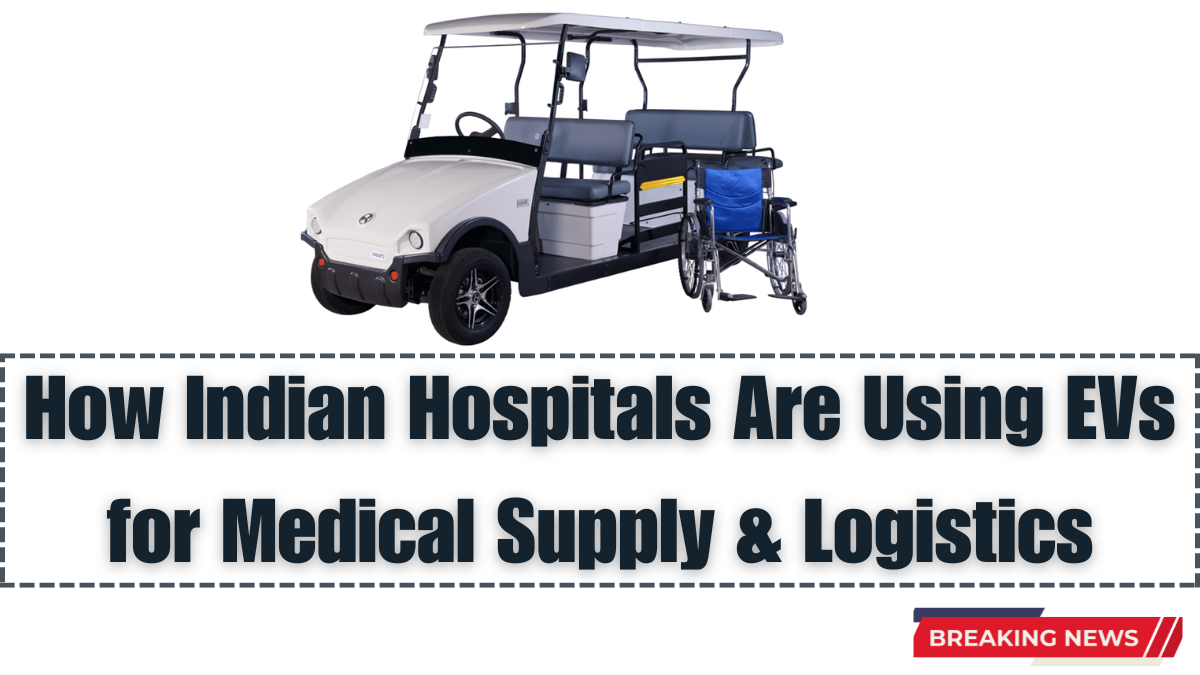India’s healthcare sector is undergoing a much-needed transformation with the widespread adoption of Sustainable Medical Transport. Hospitals across the country are now using electric vehicles (EVs) for pathology labs, vaccine delivery, blood banks, and medical supply chains. These vehicles are already running and proving that clean mobility and reliable healthcare logistics can go hand in hand.
What makes this development more impressive is its reach—not just in metro cities, but also in tier-2 and tier-3 locations. The move supports broader efforts in Green Healthcare, delivering eco-friendly solutions to logistical challenges hospitals have faced for decades.

Why Sustainable Transport Matters in Healthcare
Healthcare logistics must be fast, sterile, and highly efficient. Until recently, diesel vans and two-wheelers were used for transporting samples and supplies. Now, Sustainable Medical Transport has changed that narrative, offering better air quality, quieter roads, and improved operational economics.
Benefits of EV Adoption in hospitals include:
-
Zero tailpipe emissions
-
Lower operating and maintenance costs
-
Temperature-controlled units for sensitive samples
-
GPS-enabled live tracking
-
Cleaner and quieter hospital campuses
This real-time shift to Green Healthcare is solving problems without creating new ones.
EV Adoption for Medical Supply Chains
Across India, hospitals are deploying different types of EVs for logistics purposes. These include small three-wheelers for sample collection, four-wheeler cargo vans for medicines and surgical kits, and specialized electric ambulances for blood and organ transfer.
Here’s how the EV Adoption is shaping logistics:
| Vehicle Type | Purpose | Range per Charge |
|---|---|---|
| Electric Three-Wheelers | Local diagnostic pickups | 80–100 km |
| EV Cargo Vans | Long-distance medical supply | 150–200 km |
| EV Ambulance Units | Emergency sample or organ transport | 120–160 km |
This operational setup supports real-time scheduling, temperature monitoring, and efficient delivery across cities and rural zones.
Hospitals Leading the Green Healthcare Movement
Major hospitals like AIIMS Delhi, MGM Hospital in Maharashtra, and Apollo Hospitals have already implemented Sustainable Medical Transport as part of their logistics plan. They’re using EVs not just for internal operations but also for partnerships with diagnostic labs and medicine distributors.
Hospitals using EV Logistics now report:
-
Up to 35% cost reduction in fuel and servicing
-
Better delivery scheduling through fleet apps
-
Fewer noise complaints in residential hospital zones
-
Positive public reception and media coverage
These outcomes prove that EV Adoption is a practical, scalable solution for the medical industry.
A Green Healthcare System Built on Smart EV Logistics
This transition to Sustainable Medical Transport isn’t just a tech upgrade—it’s a cultural and environmental one. By adopting EV Logistics, hospitals are demonstrating that healthcare can be clean, efficient, and future-ready. It’s part of a growing vision to create Green Healthcare systems where every part—from patient care to logistics—is sustainable.
India is now seeing this vision come to life, one electric medical vehicle at a time.
FAQs
What is Sustainable Medical Transport?
Sustainable Medical Transport refers to the use of electric vehicles for moving medical supplies, equipment, and samples in a clean, emission-free way.
Why are Indian hospitals adopting EVs for logistics?
Hospitals are choosing EV Adoption for its cost-efficiency, zero emissions, and ability to support temperature-sensitive medical logistics.
What types of EVs are used in Green Healthcare?
Hospitals use electric three-wheelers for pickups, EV cargo vans for supply chains, and electric ambulances for emergency transport.
How does EV Logistics benefit hospital operations?
EV Logistics offers real-time tracking, better fuel savings, reduced noise, and enhanced eco-credentials for hospitals.
Are these EV initiatives already active in India?
Yes, hospitals in Delhi, Maharashtra, and southern states are already using Sustainable Medical Transport as part of their daily operations.
Click here to know more.
